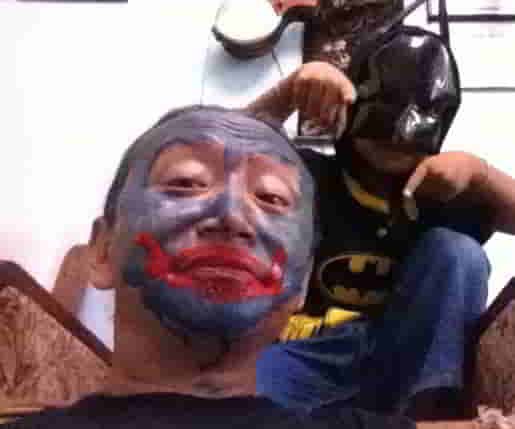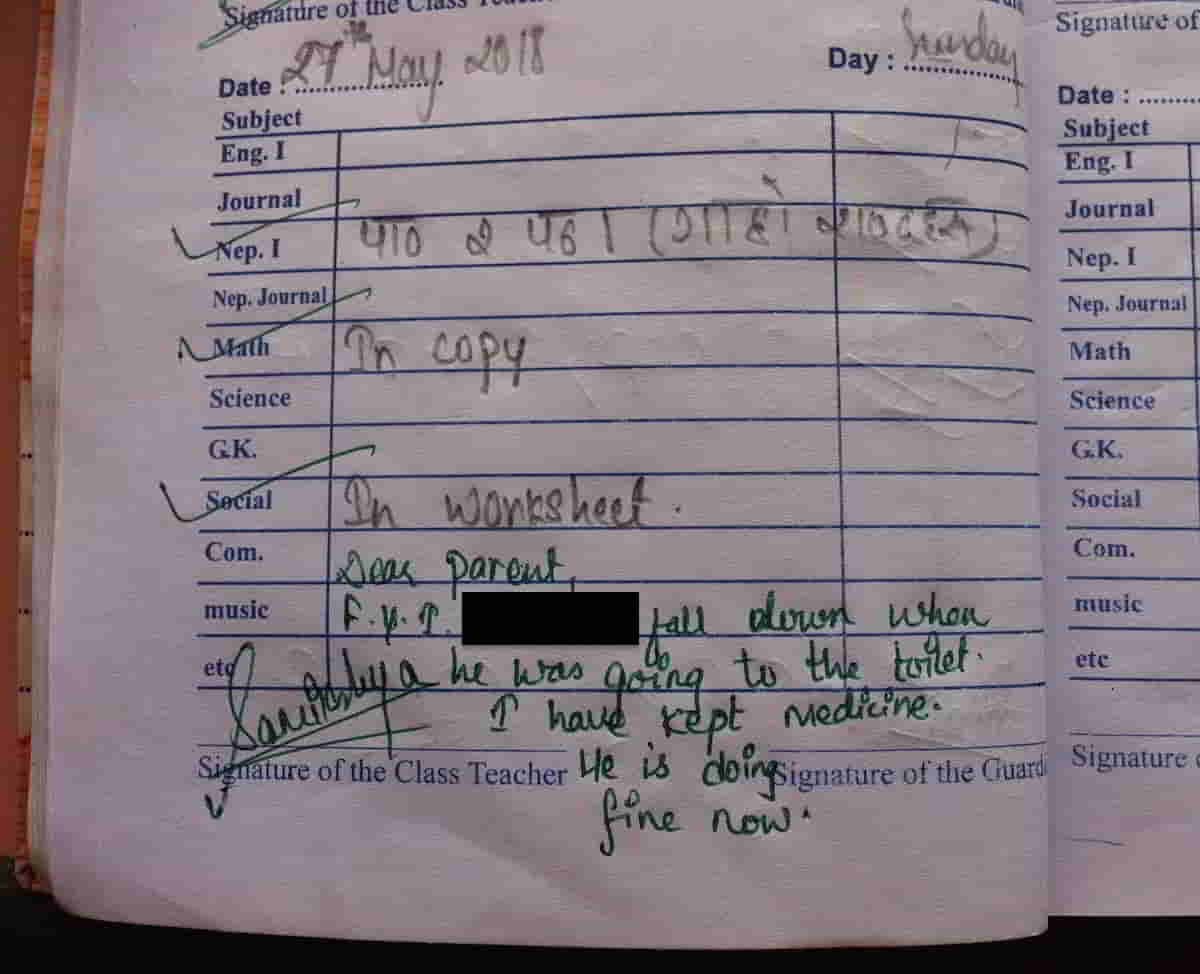To the educator in me, my most precious student to date has been my little nephew. For one because he is my youngest student. Whereas I have never taught students younger than twelve and the longest I have taught a student has been three years, I have been my seven-year old’s “teacher” since birth! For another, he is my blood. For still another, I have learned so much, and will continue to learn, from him.
So raising him, I have tried to do the best I can implementing what little I know. Some of the crucial things I have done have been different from what would be normal practice in Nepal however. I read to him, for example, which probably only a small percentage of parents in Nepal do. I haven’t used corporal punishments or the threat, or fear, of violence at all. A third of the adults in Nepal believe one must use physical violence to raise and educate children. Instead of screaming, shouting and barking orders at him, I have been respecting him, listening to him, and engaging with him just as I have tried to do with others in my life, whether a child or an adult. I answer pretty much every question he asks. I have controlled what he watches on TV, the kind of games he plays on his tablet, as well as placed limits on the amount of candies and chocolates he eats etc.
At the same time, I have been observing and learning from him, both about him specifically and about little children in general. I have been taking a lot of cues from him about what to do and/or how. He is only seven and I have already had an incredible journey of learning and discovery. Raising him has been incredibly gratifying too!
The following are reproductions of four Facebook posts I made about about keeping a tab on his school activities, following up with the school…with his permission, which incidentally is one of the number of ways I show respect to him.
The first in the series, I posted the following on March 15.

I have noticed that my little nephew (the Batman to my Joker!) is turning out to be a very very sensitive individual just like me. (But growing up in Nepal, I made sure to hide that side of me from everyone because of our culture. I have done that even as an adult in Nepal and I continue to do so.)
Recognizing that, I do some things a certain way.
One of them, for instance, is to ask his permission to visit his school whenever, following a conversation about school, I have felt the need to follow up. I tell him that I am interested in finding out more from the principal and/or his teacher and if that would ok by him.
I forgot to do that before my visit this morning. I had gone in to inquire about an incident he reported to me a couple of days ago. I had intended to get his permission before he left for school in the morning but that didn’t happen.
So, at the school, I told the school personnel what I was there for but that I needed to first speak to my nephew to get his permission to speak to his teachers. He brought my nephew over. The little one and I went away from the rest of the adults for our talk. I asked him about the incident with the older student again which he recounted, gave me the name of the teacher he had reported the incident to and pointed out the building where the older student’s classroom was. I then asked him if it would ok for me to talk to the named teacher to which he replied, “Yes.”
The other reason I talk — the other reason I have real conversations — with my little nephew instead of talking at him is because he is an individual and he deserves my respect. If I don’t respect him, he will have no respect for me!
There are adults in Nepal who I have very little respect for, for instance, precisely because they showed very little respect for me and the likes of me when we were children growing up in Nepal!
(The photo, incidentally, was taken after one of the many face-painting sessions I have had with him using paints he received as a gift from my friend Kathryn O’Connor. Obviously, he painted my face with his choice of colors!)
The following, posted on May 9, was a follow-up to the above post.
Finally, after just a little over a year, my nephew’s current school has started doing something I had been hoping they would start doing at some point.
So that he would get into the habit of talking and expressing himself verbally, instead of whining, crying, screaming and throwing tantrums etc, from when he was a baby, I raised my little nephew by talking to him. When he was a toddler and unable to speak, he would of course respond with gestures, head shakes etc. But since when he could speak and since he started going to school, he and I have had “school talk” usually in the evenings. In addition to getting him into the habit of talking, sharing his experiences with me and expressing himself, another reason behind that has been to find out if anything unusual happened at the school and if I need to follow up. Of course, there have been [such as the incident described above].
Following up with the school of course I was letting the school know that I am very much interested in my nephew’s education and what happens at school. What I had hoped for, when I kept following up on incidents my nephew reported to me, had been that the school would proactively inform me of any incident that I would want to know the details about.
Just a few days ago the school called to let me know that my nephew would be coming home with a minor scratch on his face, just below one of his eyes. A result of a small accident!
Happy uncle!!! 🙂 🙂 🙂
(His pre-school, where he was a student for two and a half years, they never did even though I did visit them to follow-up on things my nephew shared.)
My efforts continued to bear fruit. In the following May 28 update, I shared a communication from the school about an incident.

It’s good to see that my little nephew’s school is now very much clued into what I am expecting from them when anything unusual happens to him at school. The image [above] is of a short note in his diary [(planner)] describing what happened to him at school yesterday.
In [the May – post above] I mentioned how the school finally was doing something I had hoped they would start doing — basically informing us of anything unusual that happened at school.
Nepalis, like many other Asians, generally prefer “hitting around the bushes” instead of being straight and honest. They think one is being polite when one does that. There are Nepalis who consider straight shooters and “no nonsense” kind of people, people who are honest and tell you what their expectations are, what they think etc., to be too forward or too brusk or too demanding or even too arrogant etc. Not wanting to appear so, I had employed a subtle but not-so-subtle tactic to try to get the school administrators and/or his teacher to communicate to me about my nephew’s day at school: by following up on anything unusual he would report on during our “school talk”. I don’t know how many parents in Nepal follow up on anything that happens to their children at school. I don’t know how many Nepali children talk to their parents about their day in school.
Of course, there are times when, unable to really be honest, Nepalis try to convey what needs to be “said” in a passive aggressive manner. That of course is NOT the healthiest of ways to “communicate”! I have determined that Nepalis — especially Nepali men — are experts at passive aggressive behavior, and they get away with it too!!
That, however, is NOT to say that others, non-Nepalis, are NOT passive aggressive!
To round off the series, in the following Sept. 23 update, I shared an exchange with my little nephew, which showed that all my efforts to talk to him had also made the kind of impact on him that I had hoped to have.
A couple of weeks ago, sitting down for a meal, my mom laments a bruise on one the fingers my little nephew had come home with from school. As she does so, my little nephew walks over and holds out his hand to show me the bruise. It wasn’t much of a bruise at all.
Anyway, I ask him to explain what happened. He does but I don’t quite understand. It had something to do with a couple of friends in a bathroom and him trying to get in as well, but something happening with the door and his hand to end up with the bruise.
So, as usual (see shared post below for details), I ask him: “Should I come to the school to talk to your teacher?”
He goes, “No, there’s no need; that was just a ‘mistake’.”
(While the whole conversation was in Nepali, he used the English word ‘mistake’.)
As far as I am concerned, his response demonstrated that he was, firstly, well aware of what happened, secondly, that it was not significant, thirdly, there was nothing to resolve, and, lastly, didn’t warrant the adult contacting the school for clarification.
All the while we were having that conversation we were facing each other. At no time did his body language nor his voice indicate in anyway he was trying to hide something.
What do you think?

